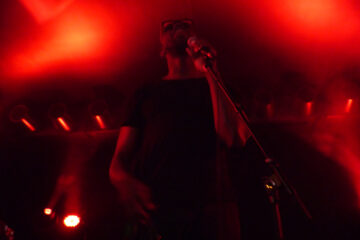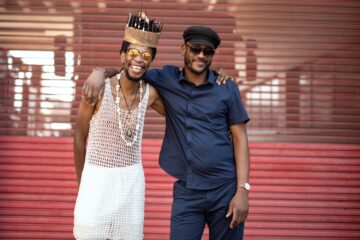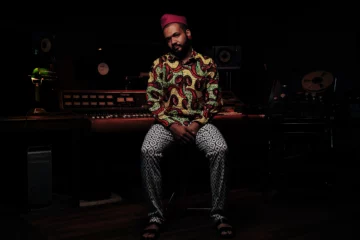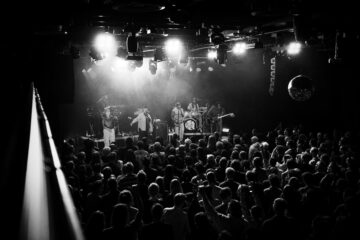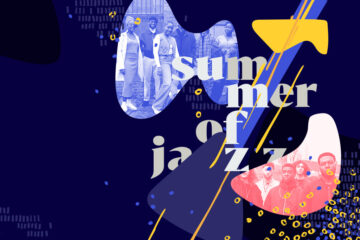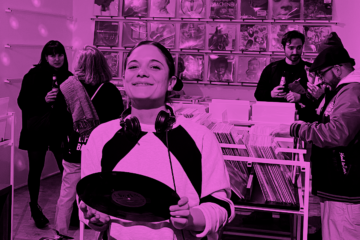Ghostpoet’s back and though he’s still mumbling on his tracks in a style that has become his own his intentions are clearer: delivering content about himself in any perspective possible, relatable to all. For the follow-up to his critically acclaimed 2010 debut album Peanut Butter Blues & Melancholy Jams Ghostpoet opted to head to a studio with a producer instead of sticking to a bedroom production. This has made Some Say I So I Say Light musically more experimental without losing the signature introverted and lonely atmosphere thanks to an abandoned East London piano.
How did running a half-marathon influence your album?
Ghostpoet: Running in general has helped me to focus my mind a bit more and gain discipline when it comes to being creative. I started running to be healthy but for me to be healthy I need to be creative so it all works hand in hand. It helped me to be alive, to talk about it. That’s a bit extreme…but it’s definitely helped my life and the record.
Pringles, French fries, food trucks, morsels and not to forget peanut butter and jelly. What’s up with food being so pre-dominant in your work?
Ghostpoet: I like food. Simple as that! I’m a big fan of food. I like talking about things everyone can relate to and food is very important in our daily lives. I think it’s a subconscious thing but I think about food a lot so it makes sense that I write about it or reference it from time to time. I think any subject matter can be special. I think it just comes down to how you put it across be it musically or lyrically.
On the song Thymethymethyme you say »…now it’s time to find out where I really want to be.« Is this the overall mindset you had while making this album?
Ghostpoet: To a certain extent it was. It’s just this thing of getting older…I’m 30 now and it’s like life up to a certain point, well for me at least, was very much about working out in my head what I wanted to do with my career and private life and just trying to work out where I want to be and what makes me happy. It’s a constant pursuit for me mentally – partly because I just over think everything, analyze and counter-analyze.
Do you think your lyrics work as prose or are they dependent on the music to function and make sense?
Ghostpoet:I write the music first and then lyrics. Those lyrics are then custom made for that particular track. I don’t have pads of lyrics that I flip through and just put into tracks. Prose is not really on my mind at all. I don’t think my lyrics are that great. I think they are all right. They are truthful. If you put them alongside great works of art they are going to lose so I really feel they work within the realm of the album but other than that that’s down to public opinion.
It’s interesting that you music comes before lyrics with a name like Ghostpoet as that could indicate a poetic background.
Ghostpoet: That’s my fault. I wish I hadn’t called myself that. You do things when you are younger without knowing the implications of your actions. I thought it worked at the time. The whole poet thing was for me to not be seen as a rapper. I wanted something on paper that doesn’t give an indication of the music behind it. That’s almost a subconscious mission of mine: it’s not about the visuals or about the name or the brand but about the music and how that makes you feel. That’s what I was trying to do with my name. But I got it wrong. I should have just called myself Ben or something boring and plain. I could add a symbol like a computer short cut to my name. Apple command…yeah, I’ll do that. That’ll be my next mission!
This time you didn’t produce at home but in a studio yet the album still sounds quite lonely and introverted. Production wise what has stayed the same and what has changed?
Ghostpoet: The demos were made at home. I moved to Dalston in East London a year and a half ago and weirdly enough there was a piano in the room I moved into. It was just before I started making the new record. I thought I might as well just start tinkering away at it and see what comes about. I can’t play piano but it just felt nice to have a physical instrument at my disposal and the piano can just be so deep. So, all the demos started from that. The original darkness of the record, the thread of darkness stems from that piano. Working in the studio and with Richard Formby was eye opening. He very much encouraged the creativity within me. He also opened my eyes to the analogue world as using analogue equipment was just alien to me. Opening that door it started to really make sense what I was trying to create, what I really needed was to mold and change things physically.
What analogue equipment did you work with?
Ghostpoet: Modular synths, analogue synths, tape echo, reverbs and other stuff that we will keep off the record because it’s good to keep the mystery. It just changed everything. I was realizing there were these sounds that I had used before on logic and this is how they came to be, this is the essence of it.
A lot of your songs revolve around very concise ostinatos creating a catchy, trance-like vibe through the repetition that is nearly surreal. Ostinatos are found in electronic music but these rhythms go back to African music. Do you see your music as part of a musical tradition?
Ghostpoet: No. It’s just music of the time, of now. I live here. I live in the moment. For me it’s about making music that is reflective of a time in my life to then move on to something else.


